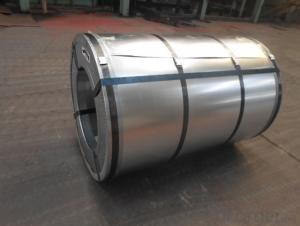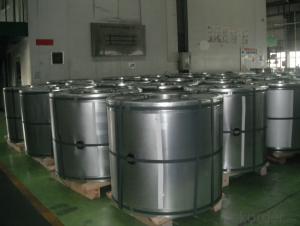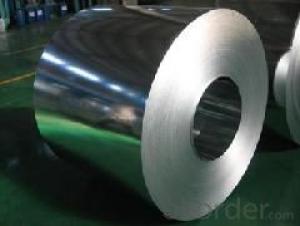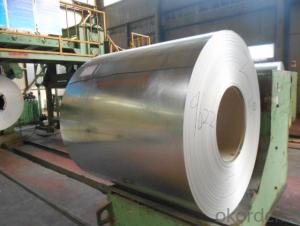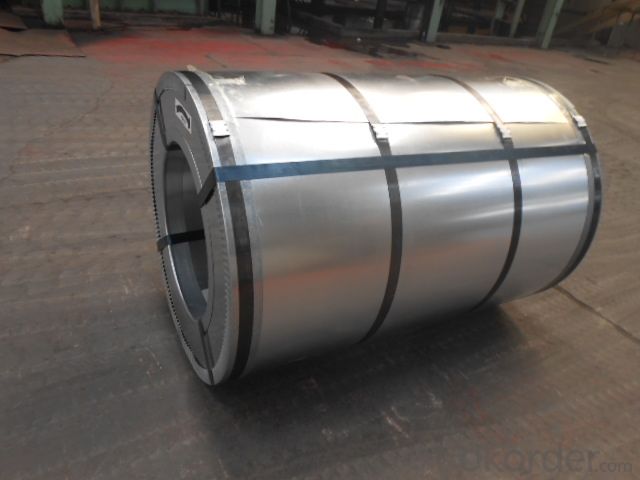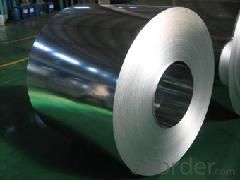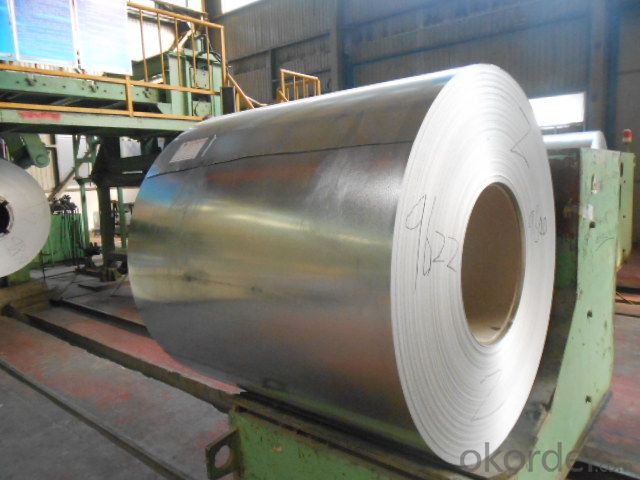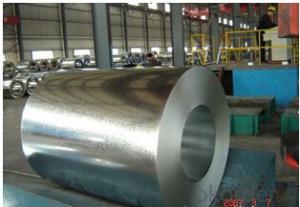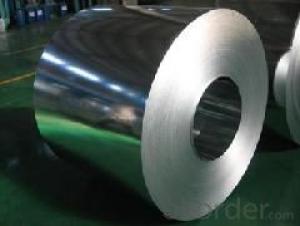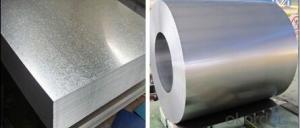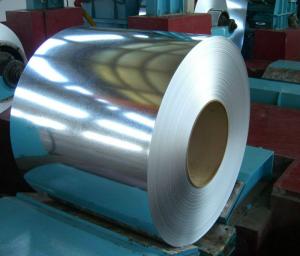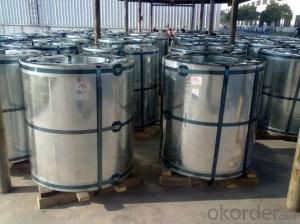Galvanized Steel Coil with Best Quality in China
- Loading Port:
- Tianjin
- Payment Terms:
- TT OR LC
- Min Order Qty:
- 50 m.t.
- Supply Capability:
- 10000 m.t./month
OKorder Service Pledge
OKorder Financial Service
You Might Also Like
Hot-dip Zinc Coating Steel Building Roof Walls
1.Structure of Hot-Dip Galvanized Steel Sheet Description:
Hot-dip galvanized steel coils are available with a pure zinc coating through the hot-dip galvanizing process. It offers the economy, strength and formability of steel combined with the corrosion resistance of zinc. The hot-dip process is the process by which steel gets coated in layers of zinc to protect against rust. It is especially useful for countless outdoor and industrial applications. Production of cold formed corrugated sheets and profiles for roofing, cladding, decking, tiles, sandwich walls, rainwater protective systems, air conditioning duct as well as electrical appliances and engineering.
2.Main Features of the Hot-Dip Galvanized Steel Sheet:
• Excellent process capability
• Smooth and flat surface
• Workability, durability
• Excellent anticorrosive property
• High strength
• Good formability
• Good visual effect
3.Hot-Dip Galvanized Steel Sheet Images:
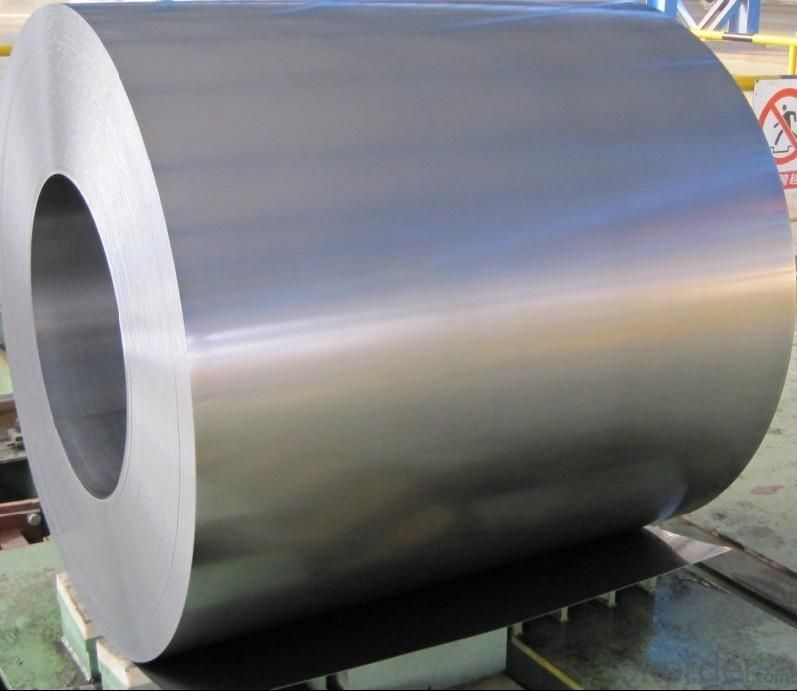
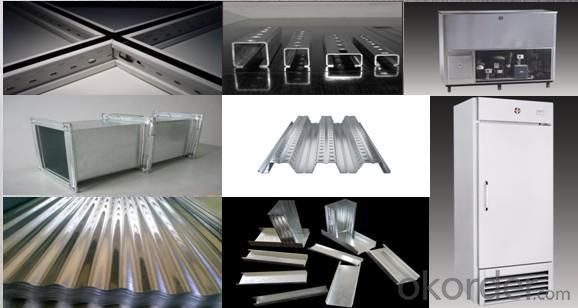
4.Hot-Dip Galvanized Steel Sheet Specification:
Standard: ASTM, JIS,EN
Grade: CS, DX51D+Z,SGCC, SS 230~550,S220GD+Z~S550GD+Z, SGC340~SGC570
Thickness: 0.1mm~5mm
Width: max 2000mm
Coil weight:3-12 MT
Coil ID:508/610mm
Surface structure: zero spangle, regular spangle or minimum spangle
Surface treatment: Chromate treatment, Oiled/dry, skinpassed/non-skinpassed
Packing: Standard seaworthy export package
Technology test results:

5.FAQ of Hot-Dip Galvanized Steel Sheet:
We have organized several common questions for our clients,may help you sincerely:
1.How about your company?
A world class manufacturer & supplier of castings forging in carbon steel and alloy steel,is one of the large-scale professional investment casting production bases in China,consisting of both casting foundry forging and machining factory. Annually more than 8000 tons Precision casting and forging parts are exported to markets in Europe,America and Japan. OEM casting and forging service available according to customer’s requirements.
2.How to guarantee the quality of the products?
We have established the international advanced quality management system,every link from raw material to final product we have strict quality test;We resolutely put an end to unqualified products flowing into the market. At the same time, we will provide necessary follow-up service assurance.
3. How long can we receive the product after purchase?
Usually within thirty working days after receiving buyer’s advance payment or LC. We will arrange the factory manufacturing as soon as possible. The cargo readiness usually takes 15-30 days, but the shipment will depend on the vessel situation.
- Q: What are the different types of steel coil coatings for corrosion resistance?
- Steel coil coatings can be classified into two main types: organic coatings and metallic coatings. 1. Organic coatings are commonly used for steel coil applications due to their excellent corrosion resistance and durability. There are four types of organic coatings: - Polyester coatings: These coatings offer good weatherability and resistance to chemicals, making them suitable for outdoor applications. - PVDF coatings: These coatings are highly resistant to UV radiation, weathering, and chemicals. They provide exceptional durability and are often used in demanding environments such as coastal areas or industrial settings. - Polyurethane coatings: These coatings offer excellent abrasion resistance and a high level of corrosion protection. They are commonly used in applications where there is a higher risk of mechanical damage or exposure to harsh conditions. - Epoxy coatings: These coatings provide excellent adhesion and chemical resistance. They are often used in industrial applications where resistance to chemicals, solvents, and oils is required. 2. Metallic coatings provide effective corrosion protection and can be further divided into two types: - Galvanized coatings: These coatings involve applying a layer of zinc to the steel surface through a hot-dip or electroplating process. This creates a barrier between the steel and the surrounding environment, providing effective corrosion protection. Galvanized coatings are widely used in various industries due to their cost-effectiveness and good durability. - Galvannealed coatings: These coatings are similar to galvanized coatings but undergo an additional heat treatment process. This results in a coating with increased hardness and improved paint adhesion, making it suitable for applications that require additional surface protection or paintability. When selecting the appropriate steel coil coating, it is essential to consider the specific requirements of the application and the level of corrosion resistance needed. Consulting with coating manufacturers or industry experts can help determine the most suitable coating for a particular application.
- Q: What are the dimensions of steel coils used in the metal furniture industry?
- The dimensions of steel coils used in the metal furniture industry can vary depending on the specific requirements of each manufacturer. However, commonly used dimensions include coil widths ranging from 24 to 60 inches (61 to 152 cm) and coil diameters ranging from 36 to 72 inches (91 to 183 cm). The thickness of the steel coils can also vary, typically ranging from 0.020 to 0.250 inches (0.05 to 0.64 cm). These dimensions allow manufacturers to efficiently produce various types of metal furniture, such as chairs, tables, and cabinets, by utilizing the steel coils as raw materials for their production processes.
- Q: How can the outer diameter and weight of steel coil be converted?
- Of course, the calculation is relatively coarse, and the volume has a lot to do with the tension.
- Q: I made a wood crossbow body but all I need is a bow which I want to be metal. I've used a thin steel sheet that I cut to appropriate size but when it bent with the string strung, it never went to original shape after being shot. I used a slightly thicker and it wouldn't bend at all. Anybody know what thickness and type to use? Any real answers are very appreciated. Thanks.
- So i do know way more about compound bows than I do about crossbows, but i'm going to enterprise an opinion. For my part, i would probably lean toward the compound bow. A part of it's only that i like them higher. However, moreover to that, more often than not when you find yourself hunting you will carry the crossbow loaded, on the grounds that the are typically awkward to load when you have the shot. If you're hunting from a blind or from a tree stand (and might figure out easy methods to load the item whilst you're up there) that's almost always ok. But when you need to tote a crossbow round whilst it's loaded, that may be a bit dicier proposition. Most crossbow safeties are lovely crude making the likelihood of by chance firing one alot bigger than with a rifle. Now, to the plus facet, a crossbow has essentially the entire upside of firing a rifle - best accuracy, same ergonomics, can run a scope on them. Without the downside - no real recoil, no longer too loud and you simply have a lovely excellent trigger on about any of them. Compounds are way more work. Plus it is much tougher to be accurate under stress with a compound than a crossbow. Regarding the protection? Don't particularly find out about that. After I was once doing shooting alot of archery, my 3 - D bow for outdoor stuff was once at ninety two pounds with a fifty five% letoff. My goal bow was once round 60. I had to pretty on the whole take care of string stretch, and tuning with the three - D bow. So i'd expect a crossbow to be in that regional. 5 hours to your nearest Bass pro? Good for a crossbow perhaps it's valued at it because no longer too many places raise them. Nonetheless, should you do back to a compound bow it appears rough to feel that would be your nearest archery professional shop. Thinkingblade
- Q: I am a complete idiot when it comes to anything musical, so please forgive me if this is a stupid question. I bought my son his first guitar, acoustic and didnt realize until after I purchased it that it has steel strings. Can I have the strings changed from steel to nylon???
- You can easily switch from steel to nylon strings or vice versa. You can buy the strings and string the guitar yourself or I'm sure you can get it done in any normal guitar shops. I've gone from nylon to steel and it hasn't affected my guitar at all. :D
- Q: If steel can rust with saltwater... then why are ships made of steel? can't we just use other metals like aluminium etc?
- Ships are made of steel and also aluminum. Some minesweepers are made from fiberglass. Steel is a comparatively cheap and easily used material. But don't be confused with the type of steel that is used. Plates do not have to be replaced every year. In fact ship s can go for years with no major steel work, and this can be extended with proper maintenance like sand blasting and painting. There are many different steel alloys with different properties. Some of them resist rusting and instead of flaking they just form a powder like barrier. Check out this link.
- Q: Can steel coils be coated with heat-resistant materials?
- Yes, steel coils can be coated with heat-resistant materials. Coating steel coils with heat-resistant materials provides protection against high temperatures and ensures the durability and longevity of the coils in various industrial applications.
- Q: How are steel coils used in the production of roofing panels?
- Steel coils are an essential component in the production of roofing panels. These coils, typically made of galvanized or coated steel, serve as the base material for manufacturing durable and high-quality roofing panels. Firstly, the steel coils are processed through a series of machines in a production facility. These machines flatten, clean, and shape the coils into the desired dimensions and profiles for the roofing panels. The process ensures that the steel coils are uniform in thickness and free from any impurities or imperfections that could compromise the integrity of the final product. Once the steel coils are prepared, they are then fed into a roll forming machine. This machine gradually bends and shapes the steel coils into the specific design and size required for the roofing panels. The roll forming process provides the panels with their distinctive corrugated or standing seam profiles, which enhance their strength and ability to withstand various weather conditions. After the roll forming process, the steel coils are cut into individual roofing panels of the desired length. These panels are then further processed to add additional features, such as coatings or finishes, for improved protection against corrosion and aesthetic appeal. The steel coils are often coated with protective layers, such as zinc or paint, to enhance their resistance to rust, UV rays, and other environmental factors. Finally, the roofing panels are packaged and shipped to construction sites or distributors for installation. The use of steel coils in the production of roofing panels ensures that the final product is strong, durable, and long-lasting. Steel is renowned for its high tensile strength, which makes the roofing panels capable of withstanding heavy loads, strong winds, and other external forces. In summary, steel coils play a crucial role in the production of roofing panels. They are transformed into the desired dimensions and profiles through a series of manufacturing processes, ensuring uniformity and quality. The resulting roofing panels are not only aesthetically pleasing but also highly durable, providing superior protection and longevity for buildings.
- Q: What is the role of steel coils in the production of conveyors?
- Steel coils are used in the production of conveyors as they serve as the main structural component for supporting and guiding the conveyor belt. These coils are typically formed into a cylindrical shape and act as a sturdy foundation for the belt to rest on. Additionally, the strength and durability of steel coils ensure that the conveyor can withstand heavy loads and constant movement, making them essential for efficient and reliable conveyor systems.
- Q: How are steel coils used in the production of steel screws?
- Steel coils are used in the production of steel screws as they serve as the raw material for manufacturing the screws. The steel coils are unwound and fed into a machine that cuts and shapes the steel into the desired screw form. This process ensures that the screws are made from high-quality steel and have the necessary strength and durability.
Send your message to us
Galvanized Steel Coil with Best Quality in China
- Loading Port:
- Tianjin
- Payment Terms:
- TT OR LC
- Min Order Qty:
- 50 m.t.
- Supply Capability:
- 10000 m.t./month
OKorder Service Pledge
OKorder Financial Service
Similar products
Hot products
Hot Searches
Related keywords
